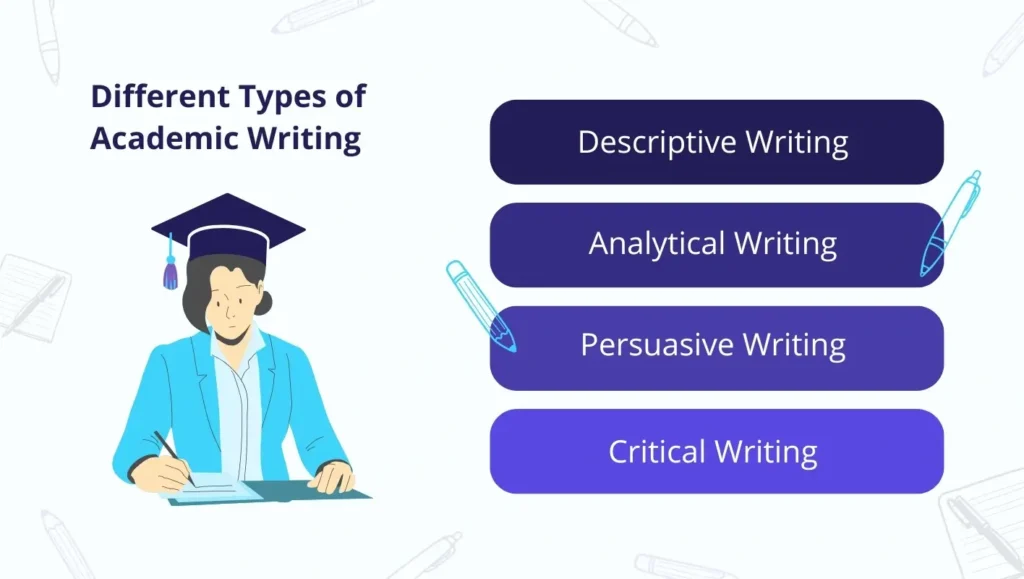
Academic writing is known to be a formal style that is used by students in educational settings. It is characterised by its precise, clear, and structured approach. Academic writing aims to cover complex ideas in a more organised way while making it easy for readers to understand and analyse the current information. The features of academic writing include formality, accuracy and precision, hedging, objectivity, citations, and planning. With all the features, academic writing also has several types.
This blog will explore the four main types of academic writing used in educational scenarios. We will also examine each type's features and the challenges students face when utilising them.

Descriptive writing is about writing a paper in a straightforward way that students most commonly use. Its primary focus is to provide facts and information without augmentation or interpretation. This writing style answers the fundamental questions of “who,”” what,” “when,” and “where.” All of them provide the audiences with a proper overview of the topic they have in their hands.
Among the types of academic writing, this one has some features for which it is considered an academic writing style. Here are the features:
Clarity—This writing must be precise and seek a higher level of understanding. Vogue terms or jargon are not used here. Instead, each word should focus on contributing to the overall clarity of the text.
Organisation—The structure of descriptive writing is not an easy one. It often follows a chronological or thematic order that helps the reader absorb information effectively.
Detail Orientation— impactful descriptive writing involves ample details to ensure painting a vivid picture of the topic, to enable readers to visualise and comprehend the subject matter.
Examples of Descriptive Writing: Examples of descriptive writing often include literature reviews, descriptive essays, and reports summarising findings.
Analytical writing is different from descriptive writing. It mainly focuses on analysis and interpretation. This type often breaks down complicated ideas by examining the relationships between several components and discussing how they can contribute.
As we know, analytical writing is different from descriptive; here are some features to help the students understand how they are different from each other:
Critical Thinking—Analytical writing requires the students to think critically and reflect on how several components intertwine. Questions like “why” and “so what” are essential here, highlighting a deeper inquiry.
Evidence-Based Arguments—The writing style depends mainly on supporting arguments with rational evidence, whether via data, examples of reliable sources, or quotations. This aspect is essential to establishing credibility.
Structured Argumentation—Analytical writing mainly offers a clear thesis yet is encouraged by rationally organised arguments. Every section of this writing builds upon the last, building a cohesive narrative that helps readers understand it through analysis.
Examples of Analytical Writing— Analytical writing includes research papers, essays executing literary works, and critiques of scientific experiments.
Persuasive writing is academic writing that aims to convince the reader of a particular perspective or argument. It challenges readers to understand the author’s stance, backed by rational reasoning and credible evidence.
Strong thesis Statement - persuasive writing resolves across a clear and bold thesis that articulates a student's perception. This thesis acts as the base for all the following arguments.
Use of Evidence—Similar to analytical writing, persuasive writing demands proper evidence. The student should focus on current facts, statistics, and examples that give a bold tone to their argument, acknowledging counterarguments.
Strategic Structure—persuasive pieces are mainly well-organized, always following a format that highlights the argument and supporting evidence and addresses opposing perspectives.
Example of Persuasive Writing — examples of persuasive writing involve argumentative essays advocating for students to study abroad. It also shows reasons why studying abroad is beneficial and personal anecdotes to persuade readers.
Critical writing combines components from all three existing types of academic writing mentioned above. However, its main focus is on evaluation and critique. This writing style includes assessing the validity of several arguments, ideas, and theories, making it a powerful tool in academia.
Evaluation of Sources: Students critically assess the potentiality and relevance of the sources they use. This includes a deeper understanding of the weaknesses and strengths present in the arguments and recognising biases.
Engagement with Counter Arguments—This type of writing requires the student to consider alternative viewpoints and properly counter-arguments them. This engagement ensures a more comprehensive discourse.
Informed Conclusions—In critical writing, the conclusion section is not about writing a summary; instead, it is about synthesising the debate and offering insights that take the discussion to further sectors for research.
Example of Critical Writing— Critical writing is a literature review that evaluates several studies on a topic, showcasing gaps in the research and advising new directions.
Your First Order
Get 20% OFF!
As these four types of academic writing are essential for students to make their assignments or projects proper. Students can also consider getting academic writing help. Here are also some common difficulties that they have to face, such as:
This challenge often prevents students from writing effectively. They need help understanding which tone to use and what to avoid.
Understanding all the structures of writing types can be a challenge for students, as they often need clarification on one with the other.
Analytical and critical writing depends on critical thinking skills, which some students need to improve; therefore, they face another challenge.
With so many assignments, it may be difficult for students to allocate time to each wrong type; hence, time is another big issue.
Understanding the several types of academic writing—descriptive, analytical, persuasive, and critical—is essential for succeeding in scholarly pursuits. Each has a unique purpose, but students face challenges adapting to it.
To overcome the challenges it is necessary to reach out to Quick Assignment Hub. Our expert, Chris Lewis, knows how to implement these four types of academic writing by promising good marks to students. We also offer our clients unique content quality with proper information. We do not encourage plagiarism and provide a free report of it. We deliver your tasks on time at an affordable rate. If you are here for the first time, there is a 20% discount on your first order. For more information, make sure to visit our website.
© Copyright Quick Assignment Hub All rights reserved.